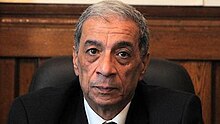Hisham Barakat
Hisham Barakat | |
|---|---|
 | |
| Prosecutor General of Egypt | |
| In office 10 July 2013 – 29 June 2015 | |
| President | Adly Mansour (Acting) Abdel Fattah el-Sisi |
| Deputy | Zakaria Abdel-Aziz Osman |
| Preceded by | Abdel Meguid Mahmoud |
| Succeeded by | Zakaria Abdel-Aziz Osman (Acting) |
| Personal details | |
| Born | Hisham Muhammad Zaki Barakat 21 November 1950 |
| Died | 29 June 2015 (aged 64) |
| Political party | Independent |
Hisham Muhammad Zaki Barakat (
Early life
Barakat graduated from Cairo University with a B.A. in Law in 1973. Appointed to the Public Prosecution, he joined the judiciary and worked in courts of first instance and appeal courts.[2] He became the head of the technical office of the president of the Cairo Appeals Court.[3]
Prosecutor General
Barakat was appointed as Prosecutor-General by Egypt's interim President Adly Mansour after Abdel Meguid Mahmoud announced his resignation from the post in the aftermath of the 2013 Egyptian coup d'état. Barakat was sworn in on 10 July 2013.[3]
On 14 July 2013, Barakat ordered the freezing of assets of 14 prominent Egyptian Islamists:
On 18 December 2013, Barakat ordered the referral of deposed Egyptian President Mohamed Morsi to criminal court for charges of espionage in a statement under the title "The Biggest Case of Espionage in the History of Egypt". According to Barakat's investigations, the international organisation of the Muslim Brotherhood, allegedly aided by Hezbollah and Hamas, is accused of being the reason behind violence within Egypt; members are accused of intending to create a state of ultimate chaos after allegedly receiving media and military training in Gaza with the aim to implement jihadists in Sinai.[5]
Assassination
Barakat was assassinated in a car bombing on 29 June 2015 as he left his home in
The death of Barakat was widely grieved and condemned across Egypt. Hours after news of the assassination broke, all private satellite channels in Egypt suspended their programmes and mourned Barakat's death.
On 2 July, Egypt's public prosecution issued a gag order restraining media outlets from reporting updates on the investigation of the case. The gag order will remain in effect until the conclusion of the investigation, while statements on the case and its updates will be issued by the acting prosecutor-general's office.[13]
In the aftermath of the assassination, Egyptian Foreign Minister Sameh Shoukry instructed all Egyptian Diplomatic Missions to open books of condolence.[14]
On 17 June 2017, the Cairo Criminal Court sentenced 31 defendants of the 67 people charged to death in connection with Barakat's assassination in a preliminary judgement.[15]
On 22 July 2017, the Cairo criminal court sentenced 28 people to death over Barakat's killing and handed 15 others each 25 years of jail sentences.[16]
See also
Similar cases of Muslim Brotherhood critiques and political adversaries assassinated in the region:
References
- ^ Kingsley, Patrick; Cairo, Patrick Kingsley (29 June 2015). "Egypt's chief prosecutor Hisham Barakat killed by Cairo bomb". The Guardian. Retrieved 3 July 2015.
- ^ "Factbox: Prosecutor General Hesham Barakat - Egypt Independent". egyptindependent.com. 10 July 2013.
- ^ Ahram Online, 10 July 2013.
- ^ Asset freeze for Islamist leaders goes into action, Egypt Independent, 15 July 2013.
- ^ "Prosecutor general orders Morsi tried for espionage along with Brotherhood leaders". Daily News Egypt. 18 December 2013.
- ^ "مصدر طبي بمستشفى النزهة: وفاة النائب العام متأثرًا بإصابته". Ahram News. Retrieved 29 June 2015.
- ^ "Egyptian prosecutor killed in bomb attack". CBS News. Retrieved 29 June 2015.
- ^ "Egypt's state prosecutor killed in Cairo bomb attack". Al Jazeera. Retrieved 2 July 2015.
- ^ "Bomb kills Egypt's Top Prosecutor Hisham Barakat as he drives to work". IBNLive. Retrieved 3 July 2015.
- ^ Youssef, Adham. "Prosecutor General's assassination sparks local uproar". Daily News Egypt. Retrieved 2 July 2015.
- ^ "Egypt's Sisi to rename Rabaa Square after slain Barakat". Al Jazeera. Retrieved 2 July 2015.
- ^ "مصادر: لا يوجد قرار جمهورى بتغيير اسم ميدان رابعة العدوية". youm7.
- ^ "Egypt imposes gag order on investigation into prosecutor's assassination". Albawaba. Retrieved 3 July 2015.
- ^ "Egypt: FM Orders Receiving Mourners At Egypt's Embassies Abroad". All Africa. Retrieved 30 June 2015.
- ^ "Cairo Criminal Court sentences 31 to death for assassination of country's top prosecutor". Abram Online. 17 June 2017.
- ^ "28 sentenced to death in Egypt over prosecutor murder in 2015". Africanews. 23 July 2017.
